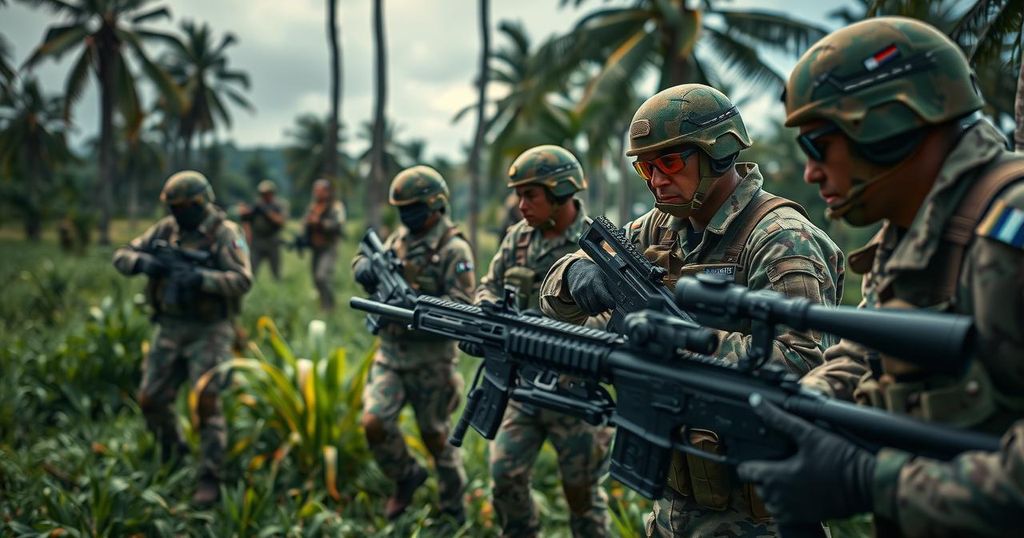Reports suggest the deployment of Russian mercenaries from the African Corps in Equatorial Guinea, with sightings in the city of Bata. While vehicles have been observed moving throughout the area, no formal confirmation from Russian PMCs has surfaced. There are growing concerns surrounding the involvement of other countries like Belarus in this scenario, indicating complex geopolitical interests in the region.
Recent reports suggest that the Russian Federation may have deployed mercenaries from the African Corps to Equatorial Guinea. According to a video published by DiarioRombe on their X account, mercenaries were sighted in the city of Bata, with vehicles actively moving, potentially indicating an escalation of their operational presence in the region. The footage reveals individuals donning a widely recognized camouflage pattern, known as MultiCam. This pattern is prevalent globally and is used by various military groups, including Russian mercenaries affiliated with the African Corps, making it difficult to definitively link these individuals to a specific faction. In June, former discussions between Russian officials, including Deputy Defense Minister Yunus-bek Yevkurov and Foreign Minister Sergei Lavrov, took place with Equatorial Guinea’s leadership, which raises questions regarding the legitimacy of the recent sightings. Yevkurov, known to oversee the Russian operations in Africa, particularly in regions such as Libya, Niger, and Burkina Faso, may be linked to these developments. Despite the evidence of mercenary movement, no official reports from recognized Russian private military contractors (PMCs) have corroborated the deployment of groups in Equatorial Guinea. It is important to recognize that Belarus is also showing interest in Equatorial Guinea, having reportedly dispatched a small contingent of mercenaries from the GardService company. Further context indicates the ongoing activities of Russian entities in Africa, such as reports about Viktor Granov, a businessman associated with arms dealer Viktor Bout. Following a U.S.-Russia prisoner exchange, Granov was reportedly present on an IL-76 cargo plane downed in Sudan, and personal identification was found at the crash site. Granov, tied to Bout, has a history of involvement in arms supply to conflict zones in Africa. On September 21, a fire incident was reported at a base for Russian mercenaries from the African Corps in Krasnodar Krai, Russia. This facility is utilized for the training of mercenaries who are subsequently deployed to various conflict areas. Following July 2023, the base has been focusing on training fighters specifically affiliated with the African Corps. The activities surrounding these deployments underscore the complexities of international security dynamics, particularly in regions experiencing volatility and conflict.
The situation regarding Russian mercenaries in Africa, particularly in Equatorial Guinea, highlights the strategic interests of Russia in the region. The African Corps of the Russian military has increasingly engaged in various conflict zones across Africa, often providing military support to regimes. Equatorial Guinea, which has potential strategic resources and geopolitical importance, has attracted both Russian and Belarusian interests. Historical lines of operation reveal a pattern of engagement where Russian PMCs are involved behind the scenes, often with ambiguous missions in politically complex environments. The connection to arms dealings through figures like Viktor Granov reflects the entangled nature of cronyism and state interests that characterize Russia’s foreign policy in regions like Africa.
In summary, the potential deployment of Russian mercenaries in Equatorial Guinea reflects ongoing geopolitical maneuvering by the Russian Federation and Belarus in Africa. While reports of mercenary sightings exist, official confirmation from recognized military sources remains absent. The interconnections of military training, arms dealings, and political partnerships underscore the complexity of these engagements and their implications for regional stability and security.
Original Source: mil.in.ua






